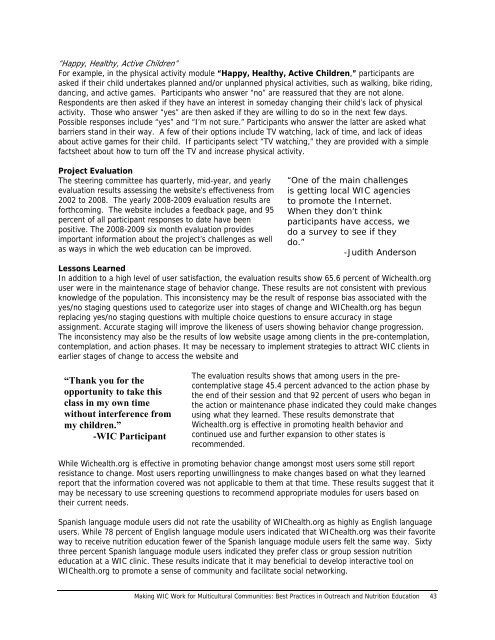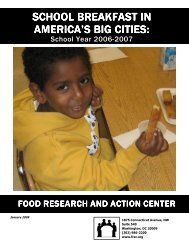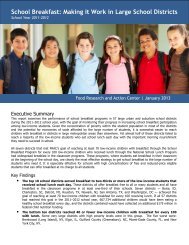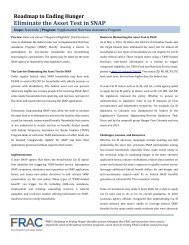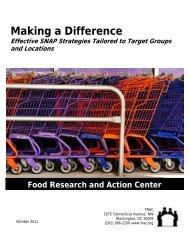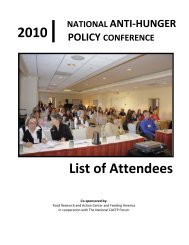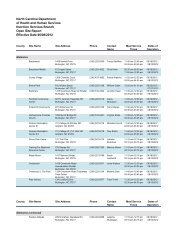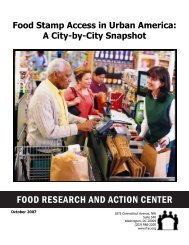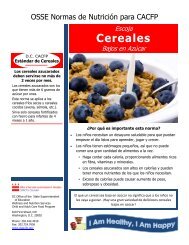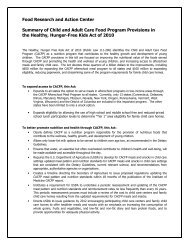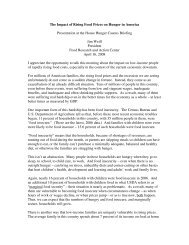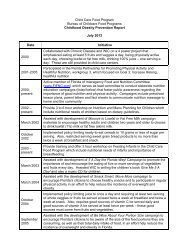Making WIC Work for Multicultural Communities - Food Research ...
Making WIC Work for Multicultural Communities - Food Research ...
Making WIC Work for Multicultural Communities - Food Research ...
Create successful ePaper yourself
Turn your PDF publications into a flip-book with our unique Google optimized e-Paper software.
“Happy, Healthy, Active Children”<br />
For example, in the physical activity module “Happy, Healthy, Active Children,” participants are<br />
asked if their child undertakes planned and/or unplanned physical activities, such as walking, bike riding,<br />
dancing, and active games. Participants who answer “no” are reassured that they are not alone.<br />
Respondents are then asked if they have an interest in someday changing their child’s lack of physical<br />
activity. Those who answer “yes” are then asked if they are willing to do so in the next few days.<br />
Possible responses include “yes” and “I’m not sure.” Participants who answer the latter are asked what<br />
barriers stand in their way. A few of their options include TV watching, lack of time, and lack of ideas<br />
about active games <strong>for</strong> their child. If participants select “TV watching,” they are provided with a simple<br />
factsheet about how to turn off the TV and increase physical activity.<br />
Project Evaluation<br />
The steering committee has quarterly, mid-year, and yearly<br />
evaluation results assessing the website’s effectiveness from<br />
2002 to 2008. The yearly 2008-2009 evaluation results are<br />
<strong>for</strong>thcoming. The website includes a feedback page, and 95<br />
percent of all participant responses to date have been<br />
positive. The 2008-2009 six month evaluation provides<br />
important in<strong>for</strong>mation about the project’s challenges as well<br />
as ways in which the web education can be improved.<br />
Lessons Learned<br />
In addition to a high level of user satisfaction, the evaluation results show 65.6 percent of Wichealth.org<br />
user were in the maintenance stage of behavior change. These results are not consistent with previous<br />
knowledge of the population. This inconsistency may be the result of response bias associated with the<br />
yes/no staging questions used to categorize user into stages of change and <strong>WIC</strong>health.org has begun<br />
replacing yes/no staging questions with multiple choice questions to ensure accuracy in stage<br />
assignment. Accurate staging will improve the likeness of users showing behavior change progression.<br />
The inconsistency may also be the results of low website usage among clients in the pre-contemplation,<br />
contemplation, and action phases. It may be necessary to implement strategies to attract <strong>WIC</strong> clients in<br />
earlier stages of change to access the website and<br />
“Thank you <strong>for</strong> the<br />
opportunity to take this<br />
class in my own time<br />
without interference from<br />
my children.”<br />
-<strong>WIC</strong> Participant<br />
“One of the main challenges<br />
is getting local <strong>WIC</strong> agencies<br />
to promote the Internet.<br />
When they don’t think<br />
participants have access, we<br />
do a survey to see if they<br />
do.”<br />
-Judith Anderson<br />
The evaluation results shows that among users in the precontemplative<br />
stage 45.4 percent advanced to the action phase by<br />
the end of their session and that 92 percent of users who began in<br />
the action or maintenance phase indicated they could make changes<br />
using what they learned. These results demonstrate that<br />
Wichealth.org is effective in promoting health behavior and<br />
continued use and further expansion to other states is<br />
recommended.<br />
While Wichealth.org is effective in promoting behavior change amongst most users some still report<br />
resistance to change. Most users reporting unwillingness to make changes based on what they learned<br />
report that the in<strong>for</strong>mation covered was not applicable to them at that time. These results suggest that it<br />
may be necessary to use screening questions to recommend appropriate modules <strong>for</strong> users based on<br />
their current needs.<br />
Spanish language module users did not rate the usability of <strong>WIC</strong>health.org as highly as English language<br />
users. While 78 percent of English language module users indicated that <strong>WIC</strong>health.org was their favorite<br />
way to receive nutrition education fewer of the Spanish language module users felt the same way. Sixty<br />
three percent Spanish language module users indicated they prefer class or group session nutrition<br />
education at a <strong>WIC</strong> clinic. These results indicate that it may beneficial to develop interactive tool on<br />
<strong>WIC</strong>health.org to promote a sense of community and facilitate social networking.<br />
<strong>Making</strong> <strong>WIC</strong> <strong>Work</strong> <strong>for</strong> <strong>Multicultural</strong> <strong>Communities</strong>: Best Practices in Outreach and Nutrition Education 43


